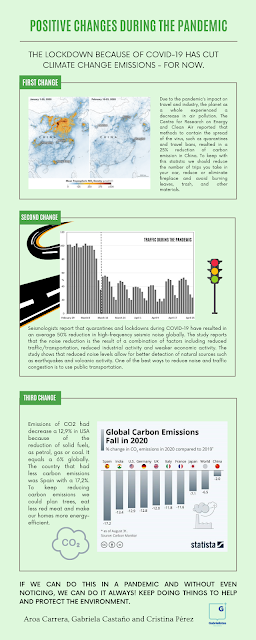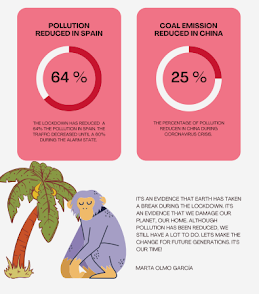Showing posts with label Natural Science. Show all posts
Showing posts with label Natural Science. Show all posts
Thursday, 10 March 2022
The Pandemic as an Opportunity
Etiquetes de comentaris:
4th ESO,
English,
Natural Science
Thursday, 25 February 2021
The Pandemic as an Opportunity
Etiquetes de comentaris:
#ODS,
#SDG,
4th ESO,
Animals,
CLIL,
English,
ESO,
GEP,
Natural Science,
Students
Thursday, 12 April 2018
Black Holes
The amazing phenomenon of black holes was a great
mystery before Stephen Hawking made an investigation. Black holes are the
result of the death of a star because when the star dies it triggers a
supernova explosion. Black holes are very famous for their great gravitational
force, they are so strong that they can absorb light. Then, it is said that
black holes fit the particles and, as there is no light, they are black.
They are very different from the wormhole because
the two act differently.
One sucks and the other takes you to another
dimension or part of the universe.
People ask questions about black holes because it
is very interesting. Black holes only suck at a certain distance, so if you do
not pass this determined distance, nothing will happen to you.
Anyway, if you change the sun through a black
hole, nothing happens. Only if you pass from a distance does gravity absorb you
and you can not escape and you will die in a different way than you normally
hear. First your body is stretched and compressed making a spaghetti.
The following video is about a NASA astrophysics and
it is a supernova explosion.
Abraham C. M.
4th ESO A
Etiquetes de comentaris:
4th ESO,
English,
Natural Science,
Science,
Students
Thursday, 26 October 2017
Salar of Uyuni
The
Salar of Uyuni is the biggest and widest salt desert in the world. It measures
one thousand, five hundred and eighty-two square kilometers, and it is located
in Bolivia. This work of the nature produces twenty-five thousand tons of salt
and one hundred and fifty million tons of lithium in one year.
It
is one of the greatest wonders of nature especially when it rains, when it
transforms into a giant mirror. In the center, there is an island with plants
and animals.
I
have chosen this natural place because this work of nature is the one that I
like the most because of all its characteristics.
Ángel H. R.
4th ESO B
Etiquetes de comentaris:
4th ESO,
English,
Natural Science,
Students
Thursday, 25 May 2017
The Plants
Plants
are living beings just like animals, they have no movement.
Plants
produce their own food through the process of photosynthesis. They capture the
energy of sunlight through chlorophyll and convert carbon dioxide and water
into sugars that they use as an energy source.
A
plant is composed of four parts, which are:
The
root: its function is to fix the plant. Through it the plants obtain nutrients
from the soil.
The
stem: is the one that gives support to the plant. Some stems are thin and
flexible, others, like those of trees, are woody and hard.
The
leaf: is the structure where photosynthesis and respiration takes place.
The
flower is the reproductive organ. Inside it has all the organs it needs to make
the fruit and the seed.
Plants
have different types with different characteristics, these are:
Green
plants like algae
Earth
plants like moss.
Vascular
plants such as ferns
Plants
with seeds like conifers.
The
vascular plants are called superior plants or cormófitas that comprise of the
flora. Its main characteristic is that they present a real differentiation of
tissues in root, stem, leaves, flowers....
The
terrestrial plants are plants that are characterized by having a series of
adaptations for life outside the water, and that are therefore responsible for
the colonization of the earth by the plants.
Green
plants as their name suggests are plants with a greenish color.
Seed plants are a group of plants comprising all vascular plant lineages that produce seeds.
Seed plants are a group of plants comprising all vascular plant lineages that produce seeds.
Gabriel B. C.
4th ESO A
Etiquetes de comentaris:
3rd ESO,
English,
Natural Science,
Students
Thursday, 26 May 2016
Depression
Hi bloggers!
Here you have the video that we have prepared for our Researching Project about depression, and remember that this disease is very important nowadays.
Here you have the video that we have prepared for our Researching Project about depression, and remember that this disease is very important nowadays.
Marina C., Silvia D., Sandra J., Nickole P.
4t ESO B
Etiquetes de comentaris:
4th ESO,
English,
Natural Science,
Students
The World Multiple Sclerosis Day
Hi bloggers!
The World Multiple
Sclerosis Day is held the last Wednesday of May.
Multiple sclerosis
is a chronic central nervous system disease. It is present throughout the world
and it is one of the most common neurological disease among the population aged
20 to 30 years.
If you want to
help people who have multiple sclerosis, you can participate in the Mulla’t
campaign, in which you can donate money or participate in a number of
activities to raise money for the foundation.
Don’t doubt and
help, participate against the multiple sclerosis!!
Bruno L. de los S.
4t ESO B
Etiquetes de comentaris:
4th ESO,
English,
Natural Science,
Students
Wednesday, 27 April 2016
Life in other Planets
Today I will talk about a controversial topic. Is there life in other planets?? In my opinion, I think that if there's life
on Earth, why not on other planets?
As some of us know, where it is more likely is
in the red planet known as Mars, because there is not too far from the sun or
very close, as our planet. This confirms that living things may be living there,
things such as plants, animals and even beings older than us.
However, we cannot confirm this theory because
we do not have enough technology to go to Mars.
We also have other planets like Saturn, Uranus
or Neptune but as they are quite far from the sun is less likely for their characteristics.
Well guys, this is my idea about the space and
its mysteries, I hope you liked it!
Gabriel B. C.
3r ESO B
Etiquetes de comentaris:
3rd ESO,
English,
Natural Science,
Students
Tuesday, 3 February 2015
Heat in Natural Sciences
In Natural Sciences in the topic of heat, we have studied various concepts, from heat conversion to changes of state through to heat balance.
First we analysed how to convert heat among different measures of temperature, Celsius degrees, Pharenheit and Kelvin. Next we studied how at a molecular level, heat can affect an object to change its state. For example increased heat can make an object go from solid, to liquid, and later to gas.
Heat gives energy to the molecules, so they change their structure, this can be seen as a change from solid to liquid and to gas. Studying heat balance, we have focused on how we can calculate the amount of heat entering and leaving a system.
Science
This term with second ESO we have been studying the topic of Diet and Health.
When looking at diet in science, the main aspects of our work have been focused on the balanced diet and what it consists in. Within this, we have studied how each component of a balanced diet helps the body. For example meat, fish and poultry contain high levels of protein helping our body to grow , while wheat, cereals and grains contain high levels of carbohydrates that provide energy for our bodies.
Sunday, 1 February 2015
My English Experience in Natural Science
"Last Friday, 30th January, I made a
presentation in Natural Sciences in English for my 2nd A class. It
was very funny because now I know how teachers feel. At first, I was very
nervous and I said to my teacher “No please, I will do it wrong, please I don’t
want to do it”. But finally I was in front of the class and they were listening
to me. I was scared when I started talking about the forces and how to
calculate them, but while the time was going by I felt much better. My English
wasn’t very good but people said to me that they understood it. My teacher congratulated
me and I was happy with the result. Now I have less fear, I can talk in
English!"
Aina Lasierra 2nA ESO
Aina Lasierra 2nA ESO
Monday, 10 November 2014
Tectonic plates and volcanoes
Do you think there is
any relation between the situation of the volcanoes and the tectonic plates? Why?
Give arguments to support your opinion.
“Yes, because we can see that the most part of
the volcanoes are on the border of the tectonic plates.
There are also few volcanoes that are not on
the border of the tectonic plates. This is because inside the Earth it is very
hot and it warms the Earth’s crust. Through the Earth’s crust holes the lava
goes out. This is what is called hot spot.”
Etiquetes de comentaris:
4th ESO,
English,
GEP,
Natural Science,
Science
Subscribe to:
Posts (Atom)




















